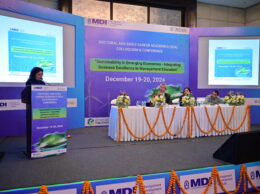Mumbai : India has a vast, 6.3 crore-strong MSME ecosystem, an overwhelming majority of which are micro and small businesses. Collectively, Indian MSMEs contribute nearly 30 percent of the country’s GDP through domestic as well as cross-border trade.
While the vibrant MSME sector of India forms a significant part of the national economy, the nature of these businesses often leaves them vulnerable to a variety of risks. MSMEs typically have high risk liability and limited financial resources, and often require policy support and financial aid schemes to remain competitive. The Indian government has instituted many initiatives to support the Indian MSME sector and in a post-crisis world, one key factor for the longevity of any MSME is succession planning and sustainability.
With this in mind, the IRM , India Affiliate, the world’s leading professional body for enterprise risk management qualifications, recently organized its second webinar under the MSME knowledge partnership series, a collaboration with the National Institute of Micro, Small and Medium Enterprises (NI-MSME, Ministry of MSME, Government of India). The panel discussion, Succession Planning Risk Management, included key industry subject matter experts: Sandeep Bhatnagar, Director – M & BD, NI-MSME, Shailesh Haribhakti, Chairman, Shailesh Haribhakti & Associates, V. Swaminathan, Head of Corporate Audit & Assurance, Godrej Industries Limited and Jitender Arora, CFIRM, MD & Head – Business Risk Management, State Steel.
The hour-long webinar, highlighted the importance of developing a robust succession plan as an essential risk management strategy for the long-term survival of MSMEs, was attended by participants from several countries, including: India, Ireland, UK and Canada, among others.
Opening the discussion, Hersh Shah, CEO, IRM India Affiliate, noted:
“Startups & MSMEs are the engines of exponential growth, manifesting the power of innovation. India’s MSMEs, employing more than 45 percent of the country’s workforce, are working relentlessly to make an impression in the global market, with risk-taking being a part of their entrepreneurial DNA. However, the disconnect between passion and reality, the challenge in managing black swan and grey rhino events, and the lack of a structured framework to pass on the business legacy to the next generation are placing these MSMEs at risk of survival. Our partnership with NI-MSME aims to nurture these businesses into risk-ready enterprises over the next decade. There’s never been a better time to get qualified in enterprise risk management. We invite SME business owners to take up IRM’s qualifications and protect their organisation.”
Discussing the need to prioritise succession planning, Sandeep Bhatnagar, Director – M & BD, National Institute for Micro, Small and Medium Enterprises, said:
“Succession planning is one of the most critical factors for MSMEs especially in the current climate, where the business environment has undergone a transformation, and there is a lot of unpredictability. The lack of skilled manpower is a major constraint for MSMEs, and when key employees retire from an organisation or leave for other opportunities, the inability to replace them with an adequately experienced successor can directly impact the wellbeing of the business. When succession is planned correctly and with foresight, it enables stability for the organisation as well as the board, staff, and managers.”
Elaborating further on the three steps of succession planning, Shailesh Haribhakti, Chairman, Shailesh Haribhakti & Associates, said:
“The primary step for MSMEs is to make their succession planning visible, and communicate transparently with employees. This is necessary to provide clarity and bolster confidence in their ability to continue normal operations in the event of a change or loss of leadership. Secondly, it is critical to invest in information technology, because dealing with up-and-down ecosystems is challenging without a compatible match or a reviewable and auditable information technology pipeline. This is where the ministry can take the lead in making it accessible to the MSMEs sector. Lastly, it is important to consider novel approaches to ensuring this succession. Employee succession is the self-evident one. The other obvious choice is to offer a private equity player the option to buy the equity outright, or to establish a trust house to vet the succession planning ideas and manage continuity of the business for the interim till a successor is onboarded.”
The Indian government aims to increase the GDP contribution of MSMEs to 50 percent, adding 5 crore jobs. While they have announced a robust policy framework, for this goal to become reality, it is imperative for the sector to augment this support with a strategic, long-term perspective towards the business and its people. Developing a strong succession plan is, therefore, an essential risk management strategy for the long-term viability of MSMEs, and founders need to have a clear blueprint in place to ensure leadership continuity for a successful future.









